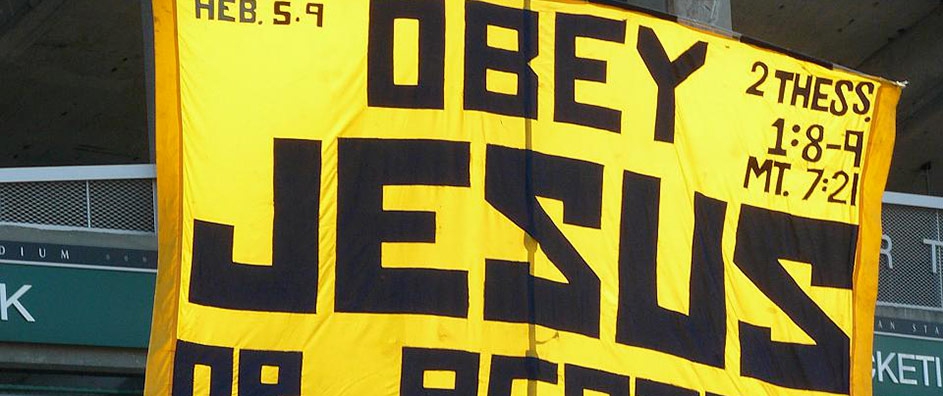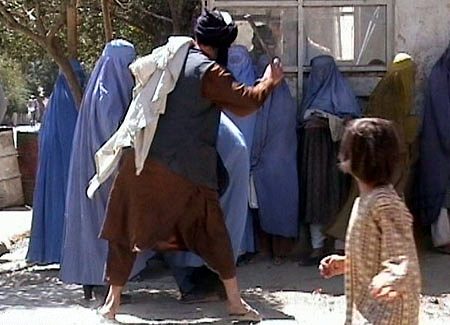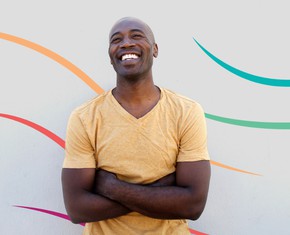The views expressed in our content reflect individual perspectives and do not represent the authoritative views of the Baha'i Faith.
When a religion claims to have access to the absolute truth, religious scholar and writer Dr. Charles Kimball explains, those rigid truth claims can form the basis for demonizing and dehumanizing those who differ:
A human view of truth, one that is dynamic and relational, enables religious people to embrace and affirm foundational truths without necessarily solidifying the words into static, absolute, propositional statements. Conversely, religious convictions that become locked into absolute truths can easily lead people to see themselves as God’s agents. People so emboldened are capable of violent and destructive behavior in the name of religion. – When Religion Becomes Evil, p. 70.
We’ve all seen this concept play out gruesomely in the modern world, as fundamentalist and overzealous “believers” wage war on each other, become terrorists who randomly kill innocent people and insist, through violence, intimidation and “holy war” that they are right and everyone else is wrong. This kind of divergence from the originally peaceful and loving teachings of faith can happen to any religion, and fundamentalist sects of Hinduism, Buddhism, Judaism, Christianity and Islam have all fallen prey to such religious violence and terror.
This horrible outcome of religious zealotry, prejudice and fanaticism, Dr. Kimball suggests, inevitably emerges from a claim to final and absolute truth:
When zealous and devout adherents elevate the teachings and beliefs of their traditions to the level of absolute truth claims, they open a door to the possibility that their religion will become evil. …people armed with absolute truth claims are closely linked to violent extremism, charismatic leaders, and various justifications for acts otherwise understood to be unacceptable. – ibid, p. 44.
The Baha’i teachings speak out vociferously against such absolutist thinking. The Guardian of the Baha’i Faith, Shoghi Effendi, makes it clear:
The fundamental principle enunciated by Baha’u’llah, the followers of His Faith firmly believe, is that Religious truth is not absolute but relative, that Divine Revelation is a continuous and progressive process, that all the great religions of the world are divine in origin, that their basic principles are in complete harmony, that their aims and purposes are one and the same, that their teachings are but facets of one truth, that their functions are complementary, that they differ only in the non-essential aspects of their doctrines and that their missions represent successive stages in the spiritual evolution of human society. – Shoghi Effendi, Summary Statement – 1947, Special UN Committee on Palestine.
What does that phrase – “religious truth is not absolute but relative” — mean about the Baha’i Faith and its relationship to the truth?
Baha’is strongly believe in two basic verities that underpin the entire message of the Baha’i Faith — religious truth is not absolute but relative; and Divine Revelation is not final but progressive. These three sentences from Shoghi Effendi succinctly summarize the Baha’i view on any religious claims to absolute truth and final revelation:
The Revelation proclaimed by Baha’u’llah, His followers believe, is divine in origin, all-embracing in scope, broad in its outlook, scientific in its method, humanitarian in its principles and dynamic in the influence it exerts on the hearts and minds of men. The mission of the Founder of their Faith, they conceive it to be to proclaim that religious truth is not absolute but relative, that Divine Revelation is continuous and progressive, that the Founders of all past religions, though different in the non-essential aspects of their teachings, “abide in the same Tabernacle, soar in the same heaven, are seated upon the same throne, utter the same speech and proclaim the same Faith.” His Cause, they have already demonstrated, stands identified with, and revolves around, the principle of the organic unity of mankind as representing the consummation of the whole process of human evolution. – Shoghi Effendi, Summary Statement -The World Religion, p. 1.
In fact, the Baha’i writings carefully, consistently and repeatedly stress that no Faith is final.
Baha’u’llah, the founder of the Baha’i Faith, cautions people “of insight” not to allow their interpretations of the Holy Scriptures of past Faiths to prevent them from recognizing the newest Manifestation of God. The Baha’i teachings say that followers of each of the great Faiths have sometimes allowed their devotion to its founder to believe that they possess the final Word of God, and therefore to reject the possibility of the appearance of any subsequent Prophet. Shoghi Effendi describes all religious truth as relative rather than absolute:
Repudiating the claim of any religion to be the final revelation of God to man, disclaiming finality for His own Revelation, Baha’u’llah inculcates the basic principle of the relativity of religious truth, the continuity of Divine Revelation, the progressiveness of religious experience. His aim is to widen the basis of all revealed religions and to unravel the mysteries of their scriptures. – The Promised Day is Come, p. 108.
Baha’u’llah categorically and completely denies the validity of this absolute concept of finality in relation to past Dispensations — and in the Baha’i Faith, as well.
You May Also Like
Comments


















But for your other question:
"Do Baha'is believe their own beliefs are relative?"
Yes, 100% relative. It's relative for this day and age of time. You should believe in it because these beliefs will be relative until the next manifestation of God (so in the next 1000 years from what the Baha'i writings have ...said).